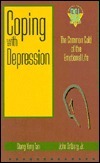What do you think?
Rate this book


117 pages, Paperback
First published January 1, 1995
Dr. Archibald Hart has pointed out that because depression has many types, it is more correct to think of depression as a "spectrum" disorder. However, despite its complexity, he notes that it is helpful to view depression as being one or a combination of the following three things or meanings (see Hart 1987, 43): (1) it can be a symptom of something else (e.g., depression can be a side-effect of a serious disease or influenza); (2) it can be a reaction to life events like bereavement or losing a job, (i.e., reactive depression); (3) it can be a disease or disorder in and of itself (e.g., when the body is suffering from some disorder of the biochemical system that usually keeps it in psychic balance or equilibrium). Dr. Hart has also recently written a helpful book no how depression can be a healing emotion when you learn how to cooperate with it (Hart 1993).Causes of Depression (pp.28-34)
-p.27